Call for co-creators
Hi everyoone,
Just a quick post to give you some news. I’m starting up a new site (soon to be announced) featuring creative services, media and courses. Most of my attention is going there these days, so this site here is getting less attention. I’m excited about this new project because I’m focusing more on collaboration, and on the business end of things. After deliberating about money quite a bit, I’m starting to see finances as a kind of fuel.
At the heart of creativity is, well, creativity and inspiration, and also relationships with the audience and co-creators. But business can be the engine to get my work out there and help me make more, and bring in other creative types. Creating and promoting: two halves of a chickpea.
That’s my view on it now, anyway.
So I’m putting out the call for co-creators. We’re talking animators, marketers, visual artists, musicians, writers, voice actors. I can’t pay you now. Sorry. I’m thinking of doing a royalty system, which gives you some skin in the game too. And as things grow, so can our projects.
I’ve been told finding collaborators is like dating. So you need to have an idea of who you’re looking for, and be willing to meet different people to see if you’re a fit. Bring it on.
Until next time,
B.T. Lowry (which stands for Bevis Theodore Lowry, by the way)
January 15, 2016 | Categories: Blog posts | Tags: animators, business, co-creators, creative, entrepreneur, marketer, marketers, musicians, project, royalties, royalty, start up, update, visual artists, voice actors, writer, writers, Writing | 1 Comment
How to save the world this Christmas
Christmas is coming, with all its good cheer and marketing madness. It can be depressing to see just how much waste the greed there is at this time of year. Here’s what I did about it.
(I don’t know how well these will show up on your phone. You’d probably be better off looking at them on a computer so you can enlarge the images)
December 15, 2015 | Categories: Blog posts, Short stories | Tags: christmas, christmas 2012 consumer, christmas 2012 consumer debt, christmas 2013 consumer confidence, christmas 2013 consumer trends, christmas 2013 consumer trends artificial, christmas and consumer culture, christmas anti consumer, christmas consumer, christmas consumer behavior, christmas consumer behaviour, christmas consumer culture consumer, christmas consumer facts, christmas consumer facts uk, christmas consumer facts uk consumer free, christmas consumer frenzy, christmas consumer frenzy by paul moth, christmas consumer frenzy by paul moth 12 days of, christmas consumer frenzy by paul moth documentary on, christmas consumer holiday non consumer, christmas consumer price index consumer, christmas consumer probe, christmas consumer rights, christmas consumer shows snl, christmas consumer spending, christmas consumer statistics, christmas consumer trends 2012, christmas consumer trends 2012 2012, christmas consumer trends 2015, christmas consumer trends consumer, christmas consumerism, christmas consumerism facts, christmas consumerism quotes, christmas consumerism snl, christmas gifts 2012 consumer reports, christmas gifts consumer rights, christmas gifts faith driven consumer, christmas guide, christmas ideas consumer insights, christmas is a consumer holiday a non consumer, christmas is consumerism i hate, christmas lights consumer reports, christmas lights consumer reports best, christmas lights consumer reports consumer reports, christmas presents consumer reports, christmas quotes, christmas shopping, christmas shopping consumer spending, christmas tree care tips, christmas tree care tips consumer confidence, christmas tree consumer reports, christmas tree consumer reports artificial, christmas tree shop consumer square, christmas tree stands best, christmas trees consumer reports, christmas trees consumer reports consumer reports, christmas trees consumer reviews artificial | Leave a comment
Life Bound Friend by Ayla Nereo, Music Video
Hi there,
Have you ever had a song strike you so much that you want to make a video for it, to accompany the mood of the song with your own introspections?
Here is my video for the beautiful song, Life Bound Friend, by Ayla Nereo. The voice in the song, for me at least, is the call of someone no longer enmeshed in worldly turmoil, free enough to sympathize with their friend still caught up in it. Like the council of a genuinely kind and mature adult for a troubled youngster.
Without further ado, here it is:
When I was about twelve, two dear friends of my family were murdered. They were an elderly couple of the Baha’i faith, named Barb and Gord Scott. They’d gone to South America to carry out missionary and charity work, and purchased a large van to transport needy people around. It was while driving in this van between cities that they were stopped by a gang of thieves. The men killed the elderly religious couple for their few possessions, particularly their wedding rings.
The news struck my mother hard. She is not a religious person, per se, but I would call her a person of faith. She wondered how this tragedy could be allowed to happen.
While she was crying at the kitchen table, face in her arms, she heard a voice, and had a kind of vision.
Barb Scott, alive and well despite the loss of her body, told my mother not to be grief-stricken. “There’s so much more than what we see here,” she said.
On another note, I’ll be going on a hiatus with my weekly scenes and such. I’m focusing my energies on flash fiction, a new novel, and experimental multimedia storytelling. So I’ll be posting more irregularly, at least for a while.
My well-wishes,
B.T. Lowry, aka. Venu Gopal das
September 12, 2015 | Categories: Blog posts | Tags: angel, ayla, cinematic, down tempo, dreamy, electronic, fan, female, festival, folk, folktronica, friend, guide, harmony, healing, hope, indie, lyrical, metaphysical, music, nereo, new age, Oakland, singer, songwriter, spirit, therapeutic, video, visionary, vocals | 2 Comments
Ghostyard
“I won’t leave my body, I told myself, no matter what happens.”
Hi. I’m B.T. Lowry. Welcome to this week’s scene of the week, Ghostyard.
Listen here:
I won’t leave my body, I told myself, no matter what happens.
A riverbank is a stupid place for a graveyard. The bodies are bound to get washed away over time. People go to the river to get clean, or take their water buffaloes to wash the dust off. It’s meant to be a pure place, and a purifying place. Some worship this river, or use its water to worship other gods. But that same water filters through graves. How can it be pure?
Stupid.
I slowed down as I neared the graveyard, keeping an eye out for the rowdy ghosts, especially him.
On the other hand, maybe it was a good place to bury the dead. I had seen fewer and fewer ghosts there, since I’d come as a kid. Ghosts tend to stick around their bodies, and if their bodies have washed away, the spirits can go on to whatever’s next for them. Another life, usually. I’d known most of the kids in our village when they were old.
That’s why cremation is good: the vessel is gone so the spirit moves on.
Usually. The one I sought tonight was old. Old and tricky.
I won’t let him fool me.
I looked carefully at the gravestones, taking in all the details. The crack there above the old woman’s name. I’d known her. Only dried flowers there now, a garland of red, yellow, orange, red, yellow, orange. If that old ghost made an illusion, he’d have to get every detail right to fool me.
He lives here. He knows the details better than me.
Never mind that. I’d just come to talk with him, ask him why he’d been causing trouble.
Was there a purple flower in that garland?
***
In India, ghost-knowledge is much more comprehensive than in the West (except the movie Ghostbusters, of course). Growing up in Canada, I sometimes wondered if ghosts existed. A glimpse of one, or word that someone had had even the remotest experience of one, was cause for gossip and fear among us kids. But in India they are categorized in many ways, largely according to the life they had while in a physical body.
If someone performs spiritual practices but also nefarious acts, for example they might become a powerful ghost. Those were often the worst kind. Sometimes whole families or even villages might be ghosts together, having been ripped out of their old lives all together by some violent event. There are ghosts fixed in trees, those who know they’re ghosts and those who don’t. Some are ‘for hire,’ and a dark tantric can incite them to attack living people. They can possess people’s bodies, and it’s easier if the people are weak-minded due to intoxication or mental illness.
Ghosts have their terms as ghosts, like jail sentences. Often they are living out what would have been the remainder of their life, which was cut short by a sudden death. It generally sucks to be a ghost, because they have the same sensory desires as they did in their lives, but without the physical senses to satisfy those desires. Powerful sages and yogis can release them from their terms as ghosts and send them on to whatever comes next, usually rebirth as a human or in another species.
Interesting stuff. Some day I’d like to develop a more complex story involving ghosts.
Thanks for reading. If you’d like to see this scene expanded into a story, then tell me in the comments that this is the one you want. If you want to see what I can do with a deeper story, pick up my novel here, Fire from the Overworld. It is the story of two young mystics who fight to restore balance in their desert village, when war erupts among its spirit rulers. Feel free to sign up for the new scenes in your mailbox each week, along with guest posts, and my thoughts about living, loving, investigation and creation.
This work is licensed Creative Commons, attribution, which means you can use it however you want, even commercially. Just let people know which bits came from me. Thanks!
September 6, 2015 | Categories: Blog posts, Short stories | Tags: ancient, Author, b.t. lowry, best, Bevis Lowry, bodies, creative, dead, death, different, emerging, episodes, episodic, evil, favorite, fiction, flash fiction, fooling, funny, genre, ghost, ghostbusters, good for children, graveyard, halloween, hare Krishna, haunted, illusion, imagination, india, learning, most, New, Non-European fantasy, odd, popular, religious, river, scene, series, short story, spell, spiritual, spirituality, themed, tricking, unique, visionary, weekly, west, writer | Leave a comment
In defense of Religion and Science.
“Instead of branding people according to which camp they’re in and which flag they’re waving, it’s far better to look at underlying motives.”
This week I’m pausing the scene-of-the-week series. I’ve been thinking about religion and science, and how too often we get caught up in pitting one against the other, as if they are natural enemies, or as if one is totally false and the other is a virtuous savior. Really that’s all bollocks.
Listen here:
They’re wars, not religious wars
There is a popular saying, that most wars and death go on in the name of religion. This is often put forward by proponents of strict rationalism and its brainchild, science.
This is not true in two ways.
People usually kill each other for land, money and power. The two world wars were not religious wars. Stalin and Chairman Mao’s attacks on their own people were not religious wars. Taken together, these make up most deaths in the twentieth century. So statistically, at least in recent times, most violent deaths have not taken place in religious wars.
Secondly, wars that go on in the name of religion are generally not actually founded in the teachings of the religions in question. The Bible never advocated the Inquisition or the Crusades, nor the genocide that took place in the Americas. These were all done in the name of the Bible and Christ, but if you look deeper you’ll find that was just a false front. Christ taught his followers to love their neighbors, not to enslave and exploit them, to take their land and replace their spiritual sites with your own. Actually the underlying reasons for these conquests was greed, and the desire for self-aggrandizement. Religion was just a front, not the cause.
Science wars?
On the other hand, a religious person might turn the tables on science and say, “Hey! You claim that so much damage has been done by religion, and that science is progressive and helpful, but science has done far more damage than religion ever has. Guns, the atomic bomb, nuclear plant disasters, plastic clogging the oceans, chemicals poisoning our rivers, greenhouse gasses heating the planet—these are all byproducts of science, not religion. Wars between humans are nothing compared to rendering the entire planet less habitable.”
But again, if you look deeper, you’ll find that the cause of these things is not science. Science is the study of that which lies within the realm of the senses or the extensions of the senses. Based on discoveries made during these investigations, various technologies can be made. These can be helpful or harmful, both in their manufacture and their use. Thus far, we see a mix. Science has produced medicines to save millions of lives, and weapons to kill just as many. The wheel and fire are also scientific discoveries, not just nuclear bombs and plastic, so even the foremost Luddite can’t write science off completely. However, most of the gadgets produced today—androids and tablets and wireless ear-pieces—are unnecessary and very harmful to the environment in their production. What is real progress? Is it the advancement of our immediate convenience, or our capacity to understand, love and give? Too often, the underlying motive for scientific progress is also greed.
Therefore let us not criticize religion or science. They each have their jurisdictions, and it’s not helpful to falsely pit them against each other. Instead of branding people according to which camp they’re in and which flag they’re waving, it’s far better to look at underlying motives.
Thanks for listening. Next week we’ll get back to our scene-of-the-week series.
If you want to see what I can do with a deep story, pick up my novel here, Fire from the Overworld. It is the story of two young mystics who fight to restore balance in their desert village, when war erupts among its spirit rulers. Feel free to sign up for the new scenes in your mailbox each week, along with guest posts, and my thoughts about living, loving, investigation and creation.
This work is licensed Creative Commons, attribution, which means you can use it however you want, even commercially. Just let people know which bits came from me. Thanks!
August 30, 2015 | Categories: Articles, Blog posts | Tags: Author, b.t. lowry, best, between, Bevis Lowry, creative, different, emerging, episodes, episodic, favorite, fiction, flash fiction, funny, genre, good for children, hare Krishna, imagination, learning, most, New, Non-European fantasy, odd, peace, popular, reconcile, religion, religious, scene, science, series, short story, spiritual, spirituality, themed, unique, visionary, weekly, writer | Leave a comment
I see the future
“Jashan wove through the dense London crowd, trying not to catch anyone’s mind.”
Hi. I’m B.T. Lowry. Welcome to this week’s scene of the week, I see the future.
Listen here:
Jashan wove through the dense London crowd, trying not to catch anyone’s mind.
He felt someone looking at him, and met her gaze without meaning to. A middle-aged woman in frumpy clothes. Sensations and images swirled around her, of her birth and her birthing a baby girl and her life wove through his mind like a thread with a sharp needle: I loved tennis but I had a child and stopped playing to give her my love. Then her future: My husband will divorce me and my daughter will marry overseas and I’ll grow old alone.
The woman glanced away. They never noticed what had happened. They didn’t know their own future, only their past. Jashan turned like a dancer, moving fast through the crowd without touching anyone, thinking of his forest and wishing he were still there with Father.
A man bumped his shoulder. Jashan turned back to him. The man’s big lips drew in a frown. Jashan caught his eyes to see if the man was angry enough to throw a punch, then the man’s life played: I want to be boss of a little tech company but I’m an employee and have been for years. I’m trained to be friendly and never show anyone but the envy of my boss burns me slowly. I’ll become alcoholic but in my last years I’ll leave that and do community service gardening and try to let this burning ambition die down.
Jashan apologized, turned away. He’d seen much worse in the minds of the crazy people.
In the forest there had been none of this. A baby fern once told him: I will grow three feet into the air before I run out of my seed-energy. There won’t be enough light filtering through the canopy for me so I’ll wither away and die.
In some ways, lives in the forest weren’t so different from here. But here the events in people’s lives had a thousand accoutrements, branching out in all directions, incredibly complex. And they were also disconnected from themselves and from the earth who nursed them.
Jashan had seen a bear crashing through the bush once: I’ll be on my own in a new patch of forest but I’ll always think of the other cubs. We grew up rolling together and sleeping in a pile. As I grow older I’ll become solitary and hibernate more than six months a year and I’ll not hunt because of sadness and I’ll starve.
There was sadness everywhere, but in the forest it was simple, elemental. But Jashan’s Father had left there to save it from these people who loved machines. He hadn’t succeeded. Now Jashan was in London, the hub of madness, on his way to meet the woman who had presided over the destruction of his home.
He wondered what her future was, and whether he could change it.
***
I’m already working on developing this one into a short story, regardless of what the vote is! My good friend Bala is helping, and his experiences with the conservative mental health system in the UK are sending the story in a new direction. If someone claimed to have powers in the UK, being able to read people’s emotions or future, they would likely be sectioned. There is an imagined norm, and deviance from that is a disorder.
Now while I don’t think the whole thing is bunk, and some people really do benefit from medication and therapy, I do think that our western world view is too limited to accommodate everything that’s ‘normal’ for human beings to experience. If you’ve ever seen the movie ‘Horse Boy,’ for example, you’ll know that autism is viewed very differently by Siberian shamans than it is by the medical profession. It’s true that some people don’t function as ordinary citizens, but don’t we need people who are out of the ordinary too, not just in one way but in many ways?
Thanks for reading. If you’d like to see this scene expanded into a story, then tell me in the comments that this is the one you want. If you want to see what I can do with a deeper story, pick up my novel here, Fire from the Overworld. It is the story of two young mystics who fight to restore balance in their desert village, when war erupts among its spirit rulers. Feel free to sign up for the new scenes in your mailbox each week, along with guest posts, and my thoughts about living, loving, investigation and creation.
This work is licensed Creative Commons, attribution, which means you can use it however you want, even commercially. Just let people know which bits came from me. Thanks!
August 23, 2015 | Categories: Blog posts, Short stories | Tags: Author, b.t. lowry, best, Bevis Lowry, clairsentient, clairvoyant, creative, different, emerging, episodes, episodic, favorite, fiction, flash fiction, funny, future, genre, good for children, hare Krishna, imagination, learning, metropolis, most, New, Non-European fantasy, odd, popular, religious, run lola run, scene, science fiction, series, short story, spiritual, spirituality, super power, themed, unique, vision, visionary, weekly, writer | Leave a comment
Lonely
“When the constellations came out at night, they were still perfectly aligned with his inner sense of direction. The world laid itself out before him.”
Hi. I’m B.T. Lowry. Welcome to this week’s scene of the week, Lonely.
Listen here:
It was all too easy, walking through these pines. Making lean-tos at night, trapping rabbits… Even the snow had a crisp layer which supported his snowshoes nicely. Fischbach peak could be tough to climb this time of year, but it was nothing that Hasran hadn’t done before. When the sun rose, it was always just where he thought it would be. When the constellations came out at night, they were still perfectly aligned with his inner sense of direction. The world laid itself out before him.
That night he came to the old cabin that he’d used last year on this same route. He tied the sled onto a tree trunk, out of habit from camping on slopes. The snow could shift and the sled would slide. It was better to be safe.
He creaked open the door. Inside, the cabin had degenerated more since he’d last come. Other men must have made camp there. New scratches marked the floor, and someone had even forgotten a tin mug.
Careless.
He went out and got his mat and blanket from the sled, then laid them on the bed. Coils sprang out in every direction but it was still better than sleeping on the floor.
He brought some dry wood out from the tarp. He’d have to leave some pieces here for the next person, though no one had left any for him. He melted snow to drink, and poured some of the boiling water into a bowl of oats and bran. Salt would be a luxury. He sat on the bed, and soon found himself staring at the doorway. It creaked in the wind, and light leaked around its edges as though heaven shone outside. Someone had carved a scene into the planks: a woman walking up a mountain.
Artists. Hasran wished for a moment that he had some hobby like that. The long nights were making him crazy, like Uncle had been crazy. The problem came in wondering too much what makes humanity tick.
***
When I was a kid, my family and I were cross-country skiing through a Canadian pine forest, when we came across an abandoned shack. The snow came half-way up its sides. Snow-laden pines surrounded it and the forest was preternaturally quiet, with the snow absorbing all sound. I clambered down into it from the surface.
The wooden planks on the walls had warped so that light streamed in. A cot took up a quarter of the total space, with rusty bedsprings coming out from mulched cotton. I imagined some hermetic trapper living there, or someone who just couldn’t find peace within civilization. It’s that experience which inspired this story.
Thanks for reading. If you’d like to see this scene expanded into a story, then tell me in the comments that this is the one you want. If you want to see what I can do with a deeper story, pick up my novel here, Fire from the Overworld. It is the story of two young mystics who fight to restore balance in their desert village, when war erupts among its spirit rulers. Feel free to sign up for the new scenes in your mailbox each week, along with guest posts, and my thoughts about living, loving, investigation and creation.
This work is licensed Creative Commons, attribution, which means you can use it however you want, even commercially. Just let people know which bits came from me. Thanks!
August 16, 2015 | Categories: Blog posts, Short stories | Tags: Author, b.t. lowry, best, Bevis Lowry, bleak, canada, creative, desolate, different, emerging, episodes, episodic, favorite, fiction, flash fiction, forest, forgotten, funny, genre, good for children, hare Krishna, hermit, imagination, learning, loney, most, New, Non-European fantasy, odd, popular, religious, scene, series, short story, snow, spiritual, spirituality, themed, unique, visionary, weekly, winter, writer | Leave a comment
Ancient Evil
“I know, I know. But we are also mortal.”
Hi. I’m B.T. Lowry. Welcome to this week’s scene of the week, Ancient Evil.
Listen here:
We’ve haunted this land since before time began. When these castles were unformed clay and stone, we watched men build them up. Inspiring a spider to bite, tempting a street-boy to his first mugging, we helped them remember that death is close for them.
I know, I know. But we are also mortal.
Silence! Have you known one of us to die?
I’ve only ever known you, Mother. Who is that one, flying in now on a rotating machine?
Let me sense him… He is an investigator. He wants to know what happened here a thousand years before his birth. Ah, there is a scorpion. I’ll use that to—
Don’t kill him.
Oh? Are you sympathetic to these tiny creatures now?
It’s not that. I have no empathy. That would be strange. But curiosity… We’ve been inspiring snakes and scorpions for so long… couldn’t we control the urge of reproduction, or the impulse that makes men build these structures so high in such a short time, even though they’ll all die so quickly? Couldn’t we control those, like Uncle does?
We were not made to do that work, son.
Hmph.
He’s nearing…
Who made us?
***
As I write this, I’m in the Abu Dabhi airport, on my way to India. I tried to get into the US, spent some time in England waiting for a long-delayed Indian visa (I wrote ‘writer’ as my profession and they were afraid I was a journalist, which is for some reason problematic.)
I’ve recently finished a book called ‘The new green history of the world,’ by Clive Ponting. It’s a realistic re heavy look at the history of the human race and our relationship with the environment.
While the history presented in the book never questions western evolutionary theory, and I think it should, and it doesn’t take into account the possibility of civilizations more ancient than what’s taught in schools, it’s still an eye-opening account of at east of the last two thousand years. In the last five hundred years especially, and the last fifty exceptionally, it’s a history of unsustainable exploitation. We are in an extreme spot now, with the world’s systems breaking down. Our energy-hungry international commerce is mostly running off oil-power. The planes, the cars, the power plants. And it seems there’s not much of that left, and the world is heating up.
So as I’m sitting in this ultra-modern airport, typing away on my laptop, I wonder, how long can this last? Will government and trade break down, or will we transition somehow into another phase which, while more modest than this massively expansionist phase we’re in now, would involve substantial international travel and trade of culture and goods.
Thanks for reading. If you’d like to see this scene expanded into a story, then tell me in the comments that this is the one you want. If you want to see what I can do with a deeper story, pick up my novel here, Fire from the Overworld. It is the story of two young mystics who fight to restore balance in their desert village, when war erupts among its spirit rulers. Feel free to sign up for the new scenes in your mailbox each week, along with guest posts, and my thoughts about living, loving, investigation and creation.
This work is licensed Creative Commons, attribution, which means you can use it however you want, even commercially. Just let people know which bits came from me. Thanks!
August 9, 2015 | Categories: Blog posts, Short stories | Tags: ancient, Author, b.t. lowry, best, Bevis Lowry, creative, demigods, different, elemental, elementals, emerging, episodes, episodic, evil, favorite, fiction, flash fiction, funny, genre, gods, good for children, hare Krishna, imagination, learning, most, New, Non-European fantasy, odd, popular, religious, rulers, satan, scene, series, short story, spirits, spiritual, spirituality, themed, unique, visionary, weekly, writer | Leave a comment
Ghosts from 500 years ago, expanded version
Hi. B.T. Lowry here, fantasy author and videographer. Welcome to the first story developed from the scene-of-the-week series.
The scene which got the most votes was the short film, “Ghosts from 500 Years ago,” so I went right ahead and developed it further. I added more footage and brought in a ghost-king from ancient India and some deep thoughts. If the first part seems familiar, jes’ keep watching.
Here it is:
My special thanks go out to Erothyme, with Biomigrant and Emma Staarbird. Their excellent music is featured in the latter part of the film, the song “Pines and Leaves,” from the album, “Sound in the Living Current.” The whole album–and all their work, really–is excellent. You can find out more about them at these sites:
http://www.erothyme.com
http://facebook.com/biomigrant
http://biomigrant.bandcamp.com
Also, thanks to unnamed temple musicians of South India and Orissa, whose celebratory sounds also grace this film.
Thanks for watching and listening and reading. Feel free to look around the site, btlowry.com, for more scenes and such. You can also read my novel, Fire from the Overworld, and sign up for the new scenes in your mailbox each week, along with guest posts and thoughts about living, loving investigation and creation. Or you don’t have to do any of that, and we can still be friends.
August 2, 2015 | Categories: Blog posts, Short stories | Tags: absurd, ancient, b.t. lowry, best, Bevis Lowry, brief, civilization, creative, different, fantasy, favorite, fiction, flash, funny, glimpse, hampi, hindu, history, imaginative, india, karnataka, kings, New, odd, princes, ruins, scene, science fiction, series, short, short story, unusual, visionary, warfare, weekly, worship | 1 Comment
Bouncing off Borders
Hi. I’m B.T. Lowry. Welcome to this week’s scene of the week, Bouncing off Borders.
Listen here:
I shuffled up to the immigration desk.
“Papers,” said a brawler of a man with a thick black mustache.
I furnished him with my passport.
He scanned it, said without making eye contact. “Why do you want to go to the USA?”
It’s a free world and this land belongs to no man, and to everyone. You people stole it from the Indians and they didn’t own it either. We’re all coming and going.
“Visiting friends,” I replied.
He frowned. “Don’t you have any friends in your country?”
No one belongs to any country or family. We’re all citizens of the Earth, and even more than that we’re citizens of the universe and children of God.
“I do,” I said. “I have friends here too.”
He looked over whatever information was on his screen about me. “It says here that you’ve been to the USA before. You’ve been to many countries. Why would you want to leave your own country, stay there with your family?”
I have no country. I just happened to be born in some piece of land recently designated by a name.
“I like traveling.”
He made a mark on some sort of checklist, then looked back at the screen. “You said you’re a writer.”
“Yes.”
“Are you a journalist?”
“No Sir.”
He looked me in the eye for the first time. “Well what do you write?”
The whole world is an allegory. You just shift it left or right like transposing a song, or the down indicates the up, earth points to heaven. There’s no fiction. Every idea indicates something real.
“Well, I filled out the landing card.”
He nodded, apparently satisfied. “Do you plan on writing when you’re in the USA?”
“No, Sir. I only write in my own country.”
“While in your own country, do you intend to write about experiences that you had while in the USA?”
“Ah, no Sir. I only write in my own country about experiences that I have in my own country, Sir.”
“Very good.”
“Can I go in?”
“No. Policy dictates that every man should live in his own country.”
“So there should be no travelers?”
“Only on business.”
I closed my eyes, told myself not to yell at this man, not to attack.
I opened them and raised my hand above my head. “Charge!”
From the back of the immigration room, a force of war-horses five hundred strong sprung from hiding. Their riders, clad in exotic, angular armor, raised hooked blades over their heads as they charged into the USA.
***
This scene was inspired by my recent visit to the Los Angeles airport. I was welcomed by men who had a keen interest in me as a person, who wanted to know all the details of my life. They were kind enough to escort me around the airport, and even gave me my own space in a locked room with other guests. I got to see the inside of a police van, and was able to return to my home country much more quickly than I’d hoped.
This experience left me with an appreciation for the human conceptions of countries, borders, and also money, because it is largely the glow of money which keeps these constructs intact. How amazing it is that a country not five hundred years old, in its current incarnation, and which was largely stolen from the older inhabitants, now keeps people who were born in other places out! It is indeed a testament to mind over matter that these ideas govern our lives and activities. In this spirit, I have decided to name a constellation of stars after myself, and should anyone ever make it to that area of the universe, I will question them thoroughly and charge them an entrance fee.
Thanks for reading. If you’d like to see this scene expanded into a story, then tell me in the comments that this is the one you want. You can also grab my novel here, Fire from the Overworld. It is the story of two young mystics who fight to restore balance in their desert village, when war erupts among its spirit rulers. Feel free to sign up for the new scenes in your mailbox each week, along with guest posts, and my thoughts about living, loving, investigation and creation.
This work is licensed Creative Commons, attribution, which means you can use it however you want, even commercially. Just let people know which bits came from me. Thanks!
July 26, 2015 | Categories: Blog posts, Short stories | Tags: anger, Author, b.t. lowry, best, Bevis Lowry, border, country, creative, deport, different, emerging, episodes, episodic, favorite, fiction, flash fiction, frustration, funny, genre, go through, good for children, guards, hare Krishna, how to, imagination, immigration, learning, line, most, New, Non-European fantasy, odd, passport, popular, religious, ridiculous, scene, series, short story, spiritual, spirituality, stop, themed, unique, victory, visionary, weekly, writer | Leave a comment
A Boy and his Goat

Hi. I’m B.T. Lowry. I’ll be recording the next few scenes in Govardhana, India. India is wonderful, but in the entire country, there is no place which is quiet, except perhaps the peaks of the Himalayas, where there’s no electricity. So don’t mind the calls of temple goers in the background, will you?
Welcome to this week’s scene of the week, A boy and his goat.
A boy stops at the edge of a gargantuan canyon. Clouds swirl below and around him, so he cannot see the limits of the abyss. Only distant peaks cut above the clouds, gleaming on the horizon. He’s been traveling for a long time, so the boy sits on the edge of the canyon, swinging his legs in the air.
He wonders how to cross… How to reach those mountains?
He removes a notebook from his pack, with wheat-colored pages. He stares out for a while, then sketches a bridge across the gorge. He draws a goat walking across the bridge. As the boy draws he grows tired, so he lies back and sleeps.
When he wakes, he is sitting up and it is night. The goat from his drawing walks ahead of him on a rickety wooden bridge, which swings in the breeze. The boy stands with shaky legs, and finds wooden slats beneath his bare feet. The mountains in the distance are purple and blue, the sky dusky. Northern lights play behind the clouds, along with constellations that move too quickly.
The goat walks ahead of him toward the purple peaks, a saddlebag jingling on her back. Her hooves clack on the slats.
The boy follows. He’s no longer tired. They walk for a long time, crossing a gorge even more massive than what he’d seen while awake. After what seems like days, they reach the far end of the bridge. First the goat, then the boy, pass onto grass which looks lush even in the dusky light. He smells night flowers and starry ponds.
The goat turns her head back, then opens a pouch in her saddlebag, using her teeth. She brings out a notebook which looks like the boy’s own, but it is longer. The goat tosses the notebook to the grass and pulls out a pencil. She sketches a bridge crossing a canyon, like a thread through the sky. Then she draws the boy there, walking across it. She shades it with a piece of charcoal.
Having finished her work, the goat lays down to rest. The boy sets his head on her soft and warm belly, then falls asleep himself.
When he wakes it is daytime, and he is still on the near side of the gorge. A thin bridge with wooden slats stretches before him. Though its end is lost in clouds, he knows it must be fixed somewhere, for it does not fall.
Cheerful, the boy sets out across the bridge toward the shiny mountains. Curious, he stops and checks his drawing book. There he sees a drawing of himself, with his head resting on the goat’s belly, and he feels at peace.
***
This scene was inspired my long-term fixation with goats, which even I don’t understand. When I was a teenager, a group of friends and I gave each other goat names (Baby Goat, Mister Goat etc.) These days, sometimes friends greet me by baaing, though I’ve never told them about my time in a teenage goat-cult. People often send me pictures and videos of goats doing funny and strange things. I like their weird, square pupils. It is perhaps all this which brought the idea of a mystic goat to my mind, one who can only be accessed through dreams, but who’s actions profoundly affect the real world.
Thanks for reading. If you’d like to see this scene expanded into a story, then tell me in the comments that this is the one you want. If you want to see what I can do with a deeper story, pick up my novel here, Fire from the Overworld. It is the story of two young mystics who fight to restore balance in their desert village, when war erupts among its spirit rulers. Feel free to sign up for the new scenes in your mailbox each week, along with guest posts, and my thoughts about living, loving, investigation and creation.
This work is licensed Creative Commons, attribution, which means you can use it however you want, even commercially. Just let people know which bits came from me. Thanks!
July 19, 2015 | Categories: Blog posts, Short stories | Tags: animal, Author, b.t. lowry, best, Bevis Lowry, boy, bridge, children's story, creative, different, dream, emerging, episodes, episodic, favorite, flash fiction, funny, goat, good for children, hare Krishna, imagination, learning, most, New, Non-European fantasy, odd, popular, reality, religious, scene, series, short story, spiritual, spirituality, themed, unique, visionary, weekly, writer | 2 Comments
The big ones, or how I got knocked out
I’m going to take a break from the scene-of-the-week to tell you about the first time that got knocked out.
(Listen below)
I had the experience of looking back at all the major points in my life simultaneously. Actually there are not so many as you might think. Birth is obviously a big one. There were a couple in my childhood from 6 to 12 years old that stand out. A lot of things happened in between these big events, of course, but not unexpected stuff. Learning to eat, sort of eventually. Learning to walk, then run.
The first time I rode a bike without training wheels was a big one. My mom and dad pushed me off, me sitting there on the bike. I flew forward, pedaling hard, and I felt like I was flying around that parking lot, almost empty of cars.
Speaking of two wheeled vehicles, I remember going on a ride which was, in retrospect, extremely dangerous. I was to drive a miniature motorcycle in hoops around a thick plastic sphere, going up, upside down, down, round the bottom, up again… I only made it to the top once before running out of momentum. The motorcycle fell down on top of me, knocking me unconscious. When I opened my eyes, I was looking at the world from a new angle of vision, and I couldn’t remember the transition, how I got there. That was the first time I ever got knocked out. These events are like bubbles fixed to the string of my life. In each bubble the memory plays out in a seamless loop, changing a little each time.
You can listen to this being read to you here:
audio mp3=”https://btlowry.files.wordpress.com/2015/04/the-big-ones.mp3″%5D%5B/audio%5D
Or to download it, right click here and choose ‘save link as’
Next week we’ll start again the Scene-of-the-Week series.
Each week, I’ll give you a scene from a story, maybe from the beginning and maybe from somewhere in the middle. These stories will not be fully written, just the scenes. You can vote for which ones you want to have made into a full story in the comments section. 🙂
July 12, 2015 | Categories: Articles, Blog posts | Tags: absurd, b.t. lowry, best, Bevis Lowry, brief, creative, different, fantasy, favorite, fiction, flash, funny, glimpse, imaginative, New, odd, scene, science fiction, series, short, short story, unusual, visionary, weekly | Leave a comment
Five Main Events
(Listen below)
We’re taking a break from the scene-of-the-week series to take do a little retrospection.
I look back at the main events in my life. There are five, really. Birth, obviously. Adolescence as a whole. My first real relationship. Joining the temple, and leaving the temple. That’s it.
I wonder, if one or the other of these events had been different or had not taken place, who I would be now. Of course, some of them really can’t be removed, like birth and adolescence. But they could have happened very differently.
Birth is huge. It’s the starting point of our life, and we come in with momentum. A rocket launched eastward may turn and go northward, but not so easily as one which was launched northward to begin with. The starting trajectory of a person’s life is the angle at which they come into the world, and this affects the entire course of their lives. Of course, the choices we make in our life also change who we are, but if I were born into very different circumstances, I reckon I’d be a very different person today.
Why is a person born into her particular life? This is, if not one of the main philosophical questions that have been asked by different schools throughout the ages, certainly one of their assistants. Science would generally have us believe that we are products of physical evolution, that our selves as we know them now—our bodies, that is, and maybe minds as well, depending on who you ask—are the result of many, many years of iteratively evolving genetics.
This is, of course, not the only idea on the subject. Many people believe that the circumstances of our birth—including our parents, the stability of our country or lack thereof, our talents, our personalities, our capacities, our economic levels, and all other obvious and not-so-obvious trappings and attributes that we may possess—have carried over into this life from the one before. All these different kinds of momentum, they say, are carried in a subtle body, which surrounds and accompanies the conscious self from life to life. While this is all quite far out, it does explain a lot of differences between us all, which are attributed to chance by the former school of thought, without further explanation.
You can listen to this being read to you here:
Or to download it, right click here and choose ‘save link as’
Come back next week to get the next scene of the week, the first of those in the new round. You can say in the comments which scene you’d like to see made into a short story.
July 5, 2015 | Categories: Articles, Blog posts | Tags: absurd, b.t. lowry, best, Bevis Lowry, brief, creative, different, fantasy, favorite, fiction, flash, funny, glimpse, imaginative, New, odd, scene, science fiction, series, short, short story, unusual, visionary, weekly | 1 Comment
Genderizer
(Listen below)
I just couldn’t decide, so I kept running the genderizer back and forth, looking at myself in the mirror. At one point I left it in between, so I was half man, half woman. On one hand, it would be good to be a man when I met the CEO. I could grip his hand really hard when I shook it. We could joke about our wives, or talk about different beautiful actresses or singers. I could win him over, man to man.
Then again, as a woman I might be able to enter his confidence more easily. I could hear him out, sympathize with him, appeal to his softer side. I might remind him of his mother, or sister. Maybe his wife.
You can listen to this being read to you here:
Or to download it, right click here and choose ‘save link as’
Vote now or forever hold your peace! (until the next round)
Figuring this out as I’m going along, I’m closing the first round on scene-of-the-week, where you can vote for the scene that you’d like to see as a short story. Tomorrow’s scene will be the last one, So leave a comment on the scene you like the best, either here, on Facebook or Twiter, or as a message to me, and see that scene transformed into a story in an upcoming post.
What is… Scene-of-the-Week?
Each week, I’ll give you a scene from a story, maybe from the beginning and maybe from somewhere in the middle. These stories will not be fully written, just the scenes. You can vote for which ones you want to have made into a full story in the comments section. 🙂
June 28, 2015 | Categories: Blog posts, Short stories | Tags: absurd, b.t. lowry, best, Bevis Lowry, brief, creative, different, fantasy, favorite, fiction, flash, funny, glimpse, imaginative, New, odd, scene, science fiction, series, short, short story, unusual, visionary, weekly | 2 Comments
Wolf in the window
You can listen to this being read to you here:
Or to download it, right click here and choose ‘save link as’
It was alright until my bear broke through the barrier separating me from the mundane life.
Let me backtrack. I was there on the London Underground, Bakerloo line, going to work. I was reading a book of myths from my childhood. I held a book in front of me, changed the page sometimes in case anyone was watching. But my eyes were closed, with sunglasses on so no one would see. The stories were behind my eyelids, and so was I.
I sat with my wolf, Santoin. He’s not so impatient as me. While I looked over our map of the sacred mountain, he just sat by me, breathing and gazing ahead. He imparted stability to me, just by being there. By being so big and solid and fierce, all that and still loyal to me.
My lighter friends, bunnies and furry bears, crawled over logs and traipsed through streams and wrestled with each other like idle thoughts on a fluffy-sky day. I colored in the areas on the map where we’d gone already. The color came from my fingertips, light brown and sepia. We’d gone a long way.
We were just about ready to set out when one of the fuzzy bears climbed up next to me and reached backward, behind me where I couldn’t see, where he wasn’t meant to go, and he pushed a barrier which I’d forgotten was there, and his finger set a ripple going like he’d thrown a stone in a sideways pond.
My sunglasses fell off. I dropped my book onto a ridged rubber floor. The man next to me on the Bakerloo line looked over, fear in his eyes. What had he seen? Had Santoin crossed over with me, just for a second? I blinked in the fluorescent lights, reaching for my sunglasses.
Scene-of-the-Week
Each week, I’ll give you a scene from a story, maybe from the beginning and maybe from somewhere in the middle. These stories will not be fully written, just the scenes. You can vote for which ones you want to have made into a full story in the comments section. 🙂
June 21, 2015 | Categories: Blog posts, Short stories | Tags: absurd, artwork, b.t. lowry, best, Bevis Lowry, brief, creative, different, fantastic, fantasy, favorite, fiction, flash, funny, glimpse, great, imaginative, New, odd, scene, science fiction, series, short, short story, unusual, visionary, weekly | Leave a comment
Which life event would you like to change?
You can listen to this being read to you here:
Or to download it, right click here and choose ‘save link as’
Yes, Madam, please just sit there. No, It won’t hurt, but you will feel a tingling. Alright, we are initiating now. Yes? Just relax, it’s alright.
It’s done, Madam. We’re getting the results now… It seems you have had eight major events in your life. Birth, entrance into school, a fight with your best friend after which you never spoke with each other again, the first time you sang in front of an audience, ah… the commencement of womanhood, your first child, marriage, your second child, divorce… and here we are today.
We can change one event within the budget you’ve specified. I advise you to consider carefully. You don’t want to lose anything that’s presently dear to you. But don’t overthink it either; it’s impossible to predict all the ramifications of your decision.
Ah, you look like you’ve made up your mind. Which one would you like to change?
Scene-of-the-Week
Each week, I’ll give you a scene from a story, maybe from the beginning and maybe from somewhere in the middle. These stories will not be fully written, just the scenes. You can vote for which ones you want to have made into a full story in the comments section. 🙂
June 14, 2015 | Categories: Blog posts, Short stories | Tags: absurd, b.t. lowry, best, Bevis Lowry, brief, creative, different, fantasy, favorite, fiction, flash, funny, glimpse, imaginative, New, odd, scene, science fiction, series, short, short story, unusual, visionary, weekly | Leave a comment
Ghosts of worshipers from five hundred years ago
This week the scene-of-week is in a video. I recently went to the magical land of Hampi in South India and was inspired to make this video about the ancient culture there, which was conquered, which has morphed into the people and customs found here today. I recommend you watch it and listen to it, but if you’d like, the transcription is below.
***
I look at these old ruins from above, this extensive temple which is crumbling in many places. The courtyard, now empty, must have been filled for celebrations. Deities would have been brought out on procession, accompanied by priests fanning them, offering them food, water, incense and flowers. People must have sang in the procession, beat drums and blown shehnais. Feasts were offered to the deities, then given to rich and poor alike. A king held ceremonies here, for good children, a long reign, and to please God. These dusty ruins were whole and alive. People lived here, they worshipped here. Some of the priests must have served in this temple for years, perhaps decades.
How can I just pass through this place when it had so much significance for them? How can I not stop to mourn their tragedies, and to wonder at the intricacies of their lives?
Scene-of-the-Week
Each week, I’ll give you a scene from a story, maybe from the beginning and maybe from somewhere in the middle. These stories will not be fully written, just the scenes. You can vote for which ones you want to have made into a full story in the comments section. 🙂
June 7, 2015 | Categories: Blog posts, Short stories | Tags: absurd, ancient, b.t. lowry, best, Bevis Lowry, brief, civilization, creative, different, fantasy, favorite, fiction, flash, funny, glimpse, hampi, hindu, history, imaginative, india, karnataka, kings, New, odd, princes, ruins, scene, science fiction, series, short, short story, unusual, visionary, warfare, weekly, worship | Leave a comment
Scene of the week: Nature Woman vs. Tech Man
You can listen to this being read to you here:
Or to download it, right click here and choose ‘save link as’
A meteorite hurtles through space. There are dormant seeds inside it, but they need a home, a planet. They cannot change the course of the meteorite and must move indefinitely, until it hits another object.
After hundreds of years, it crashes into the surface of a small moon, orbiting a gas giant. The meteorite’s surface cracks open, revealing a shiny brown seed half as tall as a man. A day passes.
The planet is not empty. On the opposite side, now in darkness, tiny machines scour the ground. They dig in then produce more of themselves, using the elements from the ground. They move over the surface like grass growing, and one in a hundred taps down deeper, searching for water for their Master. He sits in a steel-and-glass palace a hundred miles behind them. He is surrounded by machines for building, breaking down, transforming, heating, cooling and a hundred other terraforming tasks.
The seed passes into night, then back into day. It cracks. Its edges fold out like beetle-wings. Inside, many smaller seeds surround one in the center, the largest. Many of the small seeds crack open. Roots go down from them. They fight against the hard earth. They push their ways into tiny cracks, then pry them larger. The roots use the last of their life energy searching for water for their Mistress, she who is in the largest seed. She who will make this planet her own.
Scene-of-the-Week
Each week, I’ll give you a scene from a story, maybe from the beginning and maybe from somewhere in the middle. These stories will not be fully written, just the scenes. You can vote for which ones you want to have made into a full story in the comments section. 🙂
May 31, 2015 | Categories: Blog posts, Short stories | Tags: b.t. lowry, bengal, Bevis Lowry, creative, different, fiction, funny, man, nature, New, odd, outer space, scene, science fiction, senility, short story, unusual, versus, vs., weekly, woman | Leave a comment
Scene of the week: The Incarnator
You can listen to this being read to you here:
Or to download it, right click here and choose ‘save link as’
Bormeal hurtled through the streams of time, firmly gripping his hammer.
It was unsettling. Not the streams. They were beautiful in their own way. He felt like he were falling through thousands of horizontal rainbow waterfalls, suspended in an infinite void. No, what was unsettling was the fact that he’d lose his hammer. He loved it. It was part of him. It was huge, like Thor’s, and it could bash things really nicely. But even though he would still look the same as he did now when he landed—bulky, ferocious, hairy—and even though he would remember everything… he could not keep his hammer. Whatever god governed all this wasn’t very kind, not to Bormeal anyway.
When he looked up, things seemed to be going reeeally slow. The figures in the time-streams—so many faces and animals and births and deaths and triumphant moments—moved as though shrunk-wrapped and half-frozen. When he looked down, they all seemed to move reeeally fast. Whole lives came and went while he took a breath. On his own level (which was changing constantly as he fell) it all moved at a regular pace, like him. A man laughed with his family, another dug a hole for a plant. Crowds of people worked on huge stone buildings. They slowed down as they passed by him, as though they were falling upward.
As he neared Earth time, Bormeal began to discern the spiritual level of people on the planet. Incarnators saw the planet in different ways, but he saw this as a hazy, multi-dimensional, colorful graph. As he fell farther, he saw the structures of politics and nations. Blocky shapes bashing against each other with spasms and crashes, waddling across the world knocking each other around. By now, a second of Bormeal’s time would be around… it was hard to guess, but… an hour of time below. As he got closer still he could make out land masses, people milling around. Battles that were important only to the people in them, and some others alive on the planet at the time, if they were nearby.
Bormeal hit the earth, lost his hammer in filaments of light. He sighed, feeling alone without it. He looked around from the top of a hill in some semi-arid land. Scrubby grass and bald rocks. Cold and drizzly. A dozen goat-herders walked below, but they didn’t look up. Bormeal didn’t appear to everyone as soon as he landed. No, there was a proper sequence to things.
Generally, he first showed himself as an apparition, say, to a single crazy farmer. Then word got round. Everyone professed not to believe it, but everyone had their doubts. Then Bormeal appeared to a few folks in the saner section. Most of them wouldn’t tell anyone. Still, some would. Then he appeared to some of the leaders of whatever religion was prominent in that place. The monks and nuns wrote about him and distributed the knowledge to the faithful. That was pretty authoritative, but some people would always think them crazy—the proportion varied according to the society. Anyway, Bormeal would reveal himself, soon after that. Some would think he was a demon, others a god. He was neither, not the way they thought about such beings anyway.
Ah, one of the shepards had strayed behind the others. Bormeal manifested himself, puffing into the air with some nice effects around him, like yak-tails made of light were being whisked around behind him. He walked down, all buff and shiny looking, and approached the startled man.
This is part of the Scene-a-Week series. Each week, I’ll give you a scene from a story, maybe from the beginning and maybe from somewhere in the middle. These stories will not be fully written, just the scenes. You can vote for which ones you want to have made into a full story in the comments section.
May 24, 2015 | Categories: Blog posts, Short stories | Tags: absurd, b.t. lowry, Bevis Lowry, creative, different, fantasy, fiction, funny, New, odd, scene, science fiction, short story, unusual, weekly | 3 Comments
Scene of the week: Crazy Auntie
You can listen to this being read to you here:
Or to download it, right click here and choose ‘save link as’
The family’s old, crazy auntie held one finger to her mouth, glanced around as to indicate all the others in the house, and gave me a look could only be described as ‘extremely conspiratorial.’ She pushed her taped-up glasses up on her nose, adjusted the sari on her frail, skinny frame. Eyebrows raised, eyes wide. Grinning like a little girl.
She spoke to me in Bengali, still glancing around and grinning. I sat by my computer, listening. I couldn’t understand her, but it was eminently obvious that she was revealing her plan to me, telling me the whats and the hows and the whens. She’d carried out some trickery, somewhere in the house. Maybe she’d mixed ingredients in the larder. Maybe she’d stolen something. Maybe she’d said something to one person, something else to another. I didn’t know, but it was mischief, and I was in on it.
This is part of the Scene-a-Week series. Each week, I’ll give you a scene from a story, maybe from the beginning and maybe from somewhere in the middle. These stories will not be fully written, just the scenes. You can vote for which ones you want to have made into a full story in the comments section.
May 17, 2015 | Categories: Blog posts, Short stories | Tags: b.t. lowry, bengal, Bevis Lowry, confusion, creative, different, fiction, funny, india, New, odd, scene, senility, short story, unusual, weekly | Leave a comment
Scene-of-the-week premiere: Throwing a guy through time
Welcome to the first of the scene-of-the-week series. Every week there’ll be a new scene, a glimpse of a potentially complete story. You get to vote which one you want to see as a full story in the comments below.
You can listen to this being read to you here:
Or to download it, right click here and choose ‘save link as’
Time Hucker went into trance using his special machine. His assistant Gerald, who he’d seen as a big, hairy boy a moment before, now appeared as a tiny ball of light. Time Hucker’s own body now looked luminescent, his arms glassy. He stood looking down as though from a high bridge. He took hold of the Gerald-light, held him in his hand as though weighing him, and looked down into the time streams. Gerald would take the streams seriously, once he was far enough in. Oh yes.
The trick was throwing him at just the right moment…
Each stream was a different color, flowed straight in its own direction, from horizon to horizon. They looked like a hundred thousand curving, translucent rivers, all stacked on top of each other. Their distinct colors—green, blue, orange, yellow—mixed with each other in ways that he still found amazing, though he wouldn’t admit it to Gerald.
Far, far below lay Gerald’s destination, the Earth timeline. Time Hucker watched, waited. Wait for it. Wait…
He imagined himself saying to Gerald, who was both his apprentice and nephew, ‘It is tricky to toss someone from one flow of time into another, Gerald. When I first started training, my teacher had me throw stones. From where I was, I threw a stone down into the faster time streams. It’s a bit like throwing a ball from a bridge, you see, and trying to get it to land on a particular square inch of grass. Tricky. Well, it’s actually more like that example, except gravity acts on the ball more and more, the closer it gets to the ground. Because you see, Gerald, time gets denser in the lower dimensions. Not like here.’
Savvy words, but then Gerald wouldn’t listen to such things, because Gerald was more interested in the pretty colors that the rivers of time made when they combined with each other. He liked to swim among them, diving and surfacing, seeing how the colors changed depending on where he was among the layers. Why, if Time Hucker would let him, Gerald would change the time streams, just for aesthetic effect!
If, however, Gerald were a good student, listening attentively, Time Hucker would have said, ‘When I threw them, the stones would appear somewhere in the timeline, very suddenly and moving very fast. Earth people would think them meteorites. Which they were, but from another time.’
Then Gerald would laugh at Time Hucker’s wit.
Time Hucker would smile and pat Gerald’s head affectionately. ‘But the problem, you see, is that people are much more unpredictable than stones. They can adjust their fall, like someone with a parachute, pulling at the corners to change direction. They can move left and right, even slow themselves down a little bit.’ His hands tightened on the Gerald-ball. ‘But they still had to move, very, very fast, Gerald. Like you will now.’
For Gerald was not an attentive student. No, Gerald had to be taught a lesson.
Ah! Wait for it…. wait…. hold…
With all his strength, time Hucker hurled Gerald down into the time streams.
This is the first week in the, Scene-a-week series. Each week, I’ll give you a scene from a story, maybe from the beginning and maybe from somewhere in the middle. These stories will not be fully written, just the scenes. You can vote for which ones you want to have made into a full story in the comments section. Sound like fun?
May 10, 2015 | Categories: Blog posts, Short stories | Tags: absurd, b.t. lowry, Bevis Lowry, creative, different, fantasy, fiction, funny, New, odd, scene, science fiction, short story, unusual, weekly | Leave a comment
New lands and old home
There is tension in spiritual life. If I am to progress from being semi-aware to fully aware, I must face conflict, internal and external. My goal may be a state of peace, but the journey will hold challenges. One such challenge is the conflict between progress and familiarity.
I’m amazed by the endless vista before me, a limitless realm of possible conscious states, progressing up to the source of all things. And yet, like a sailor clinging to the rocks of his own shore, I am reluctant to disembark.
New lands and my old home. The wide sky and comforting ground.
States of consciousness
My home, in this context, is the consciousness that I’m accustomed to. It is now filled with family and friends, with ideas that I’ve been cultivating for years. I have a particular understanding of reality and illusion. But these things are in flux, with new elements coming and old ones going. My understanding changes. My company changes. Is there anything that is intrinsic to my very being, which will remain? if I am to progress, everything must be laid on the table and questioned.
Yet I am afraid to do it.
I recently finished my first book , Fire from the Overworld. It is a Visionary Fantasy novel, set in an alternate world. I don’t wish to toot my own horn here, but because these themes run throughout the book, I’d like to speak of it here.
Two kinds of journeys
A sketch of the story for you: two apprentice mystics live in a desert village. The girl is Yuvali and the boy is Héyowan. Both face the conflict between progress and safety in different ways.
Yuvali travels from her body, and gradually enters higher dimensions. This thrills her and she thinks she can go on forever, but to do so she must leave her old conceptions of self. She must leave attachment to her father, her mother, her village, and her body.
The other main character, Héyowan, can enter a the mind of a person or animal as though stepping into a cave. He experiences their thoughts and feelings as though they were his own. He can move into their deepest centers, to see their glowing hearts. It is a great intimacy that is possible even with enemies. He finds himself mixing with them, forgetting himself. He strives to protect the sanctity of his own identity, even while trying to help others, but often he fails.
Kinds of enlightenment
Years ago, I enjoyed reading Siddhartha (by Hermann Hesse) and The Red Lion (by Maria Szepes). I consider them to be part of the Visionary Fantasy genre. They inspired me to write more, and yet in both cases I was dissatisfied with the climax, with the point of ‘enlightenment’ of the main characters. In both books, the characters realized that everything in the universe is undifferentiated, and that they are part of that whole. When I read the books, I thought, ‘Well that’s all right. But there must be an actual center to things, not just a diffuse oneness.’ (I’m paraphrasing. I think I was not so eloquent.) This is my conviction, and along with the Vedic teachings, it has inspired the cosmology of my story.
Now, I won’t tell you whether Yuvali and Héyowan are able to reconcile all these things, so that they can make spiritual progress and also help their people, but I invite you to find out for yourself!
They say art is never finished, and I agree. Nonetheless, I’m satisfied with how the story has turned out. It’s definitely been a journey for me. As I grew near to the themes and characters, I learned about myself. I hope you do too; in your reading, writing and spiritual life.
Next week, I’ll be starting a new series called, ‘Scene a week.’ Every week, I’ll give you a scene from a story, maybe from the beginning and maybe from somewhere in the middle. These stories will not be fully written, just the scenes. You can vote for which ones you want to have made into a full story in the comments section. Sound like fun?
May 3, 2015 | Categories: Articles, Blog posts | Leave a comment
‘Fire from the Overworld’ available now!
(click to view)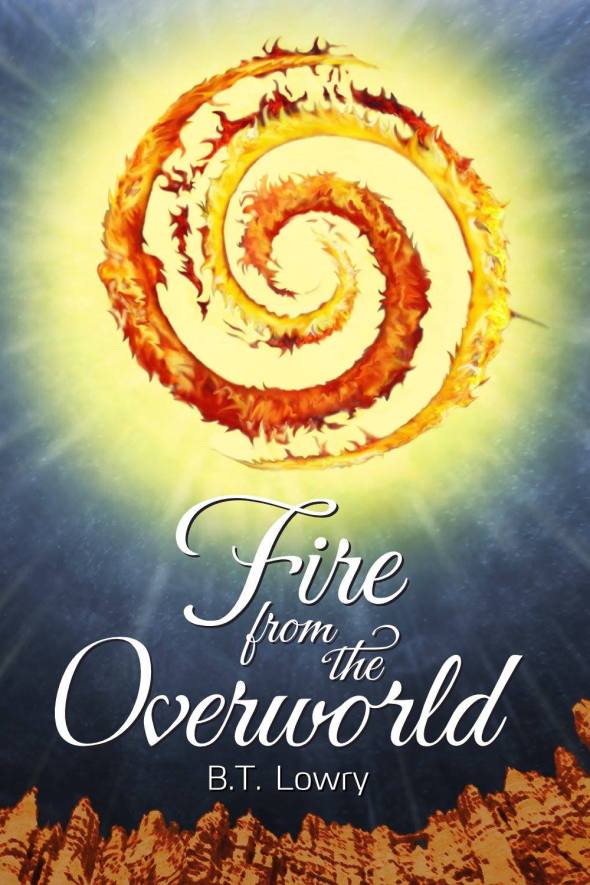 (click to view)
(click to view)
April 21, 2015 | Categories: Blog posts, Short stories | Tags: bengal, bevis, comparison, creativity, culture, diverse, diversity, eastern, empathy, fiction, helpful, ideas, india, inspiration, inspired, international, knowing, lowry, mystic, mystical, New, Novel, original, relationships, spirituality, story, tools, upcoming, useful, writer, Writing, yoga | Leave a comment


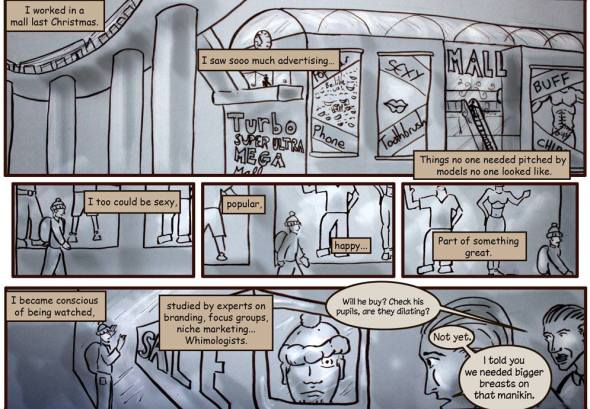
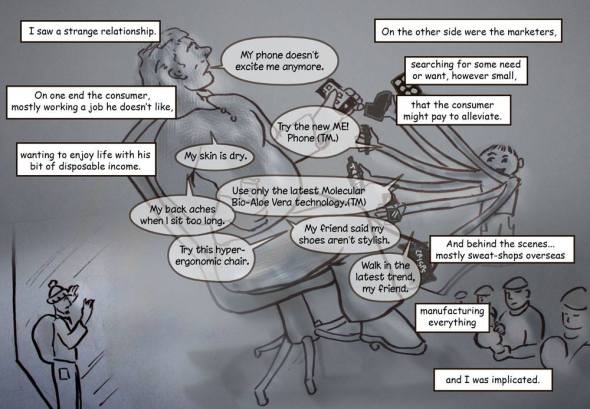
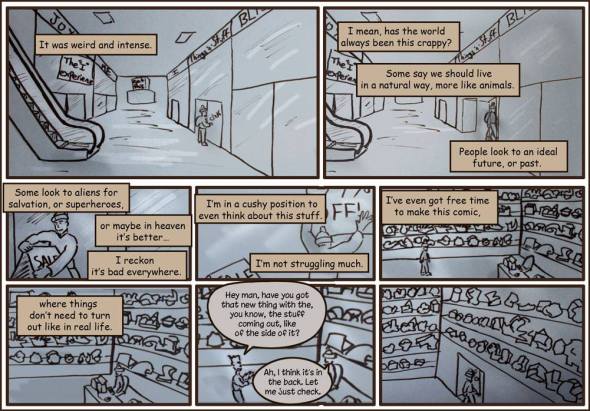
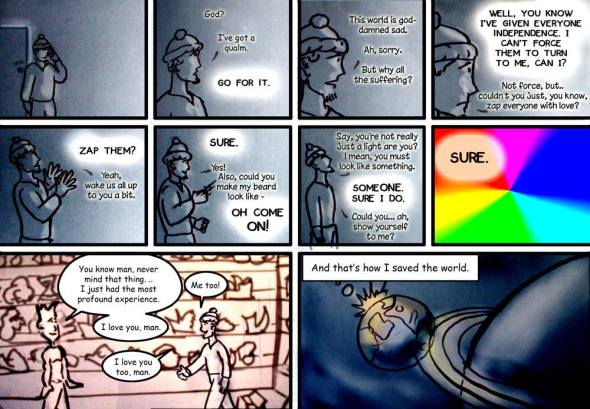



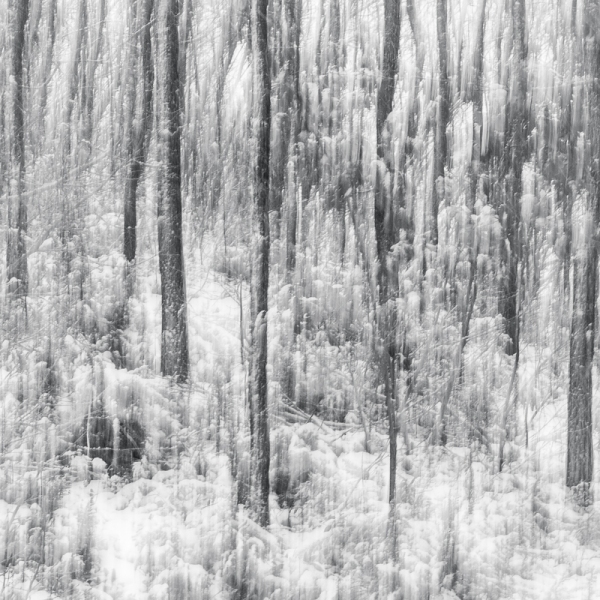
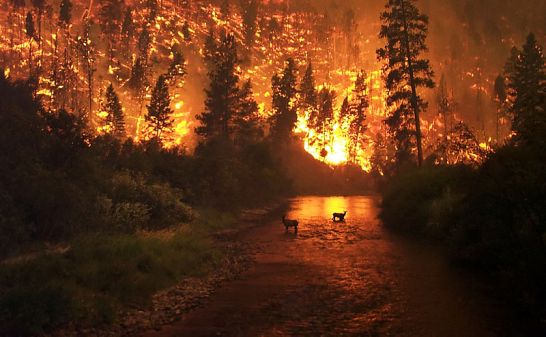





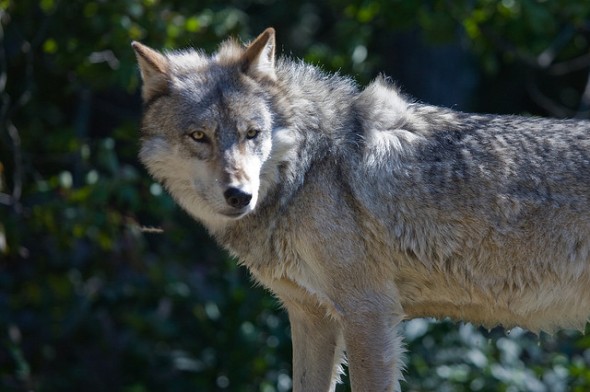



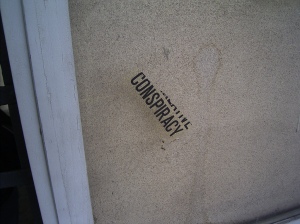




The Glories of Non-Renaissance Art
This is a fresco from a temple in India. The temple is in Varsana, in the Vrindavana area, the place where the goddess Srimati Radhika is said to have grown up, during her pastimes in this world. Yesterday I spent some time with a group of friends, there in the temple, discussing this piece of art. The intriguing aspects of this fresco are so many, the discussion it provoked so lively, that I am compelled to present my perspective, for posterity. I will try my best to do this in language resembling that found in art history books, with a few weird breaks from that form.
Ahem.
An overiew
Firstly, and overview of what is occurring. This painting shows Vasudeva Maharaja carrying the child Krishna across the Yamuna, from Mathura to Vrindavana. He did this to bring Krishna beyond the reach of the cruel Kamsa, lest that tyrannical king should smash the baby, as he did many others before. In the upper right, Krishna is appearing to Vasudeva and his wife Devaki. He manifested initially in the form of four-handed Narayana, before transforming into Baby Krishna, at the request of Devaki. It’s a deep and intricate pastimes, and here we (I?) am just touching on it. Below that, Kamsa is shown smashing one of Vasudeva and Devaki’s previous children. On the left are Vasudeva and Devaki praying, or possibly Nanda Maharaja and Mother Yashoda awaiting the arrival of Krishna, as one local sadhu asserted.
Subjective size
First of all, the relative size of the people and things in the painting is completely relative to their importance to this instance of the pastime. Western figurative art tends to mimic the camera (well, the laws of perspective preceded the camera). Western abstract art is, in this author’s humble opinion, mostly terrible, and not worth writing about.
But what we see in this painting is different. Compared to what a camera sees, it is completely wonky. Vasudeva is taller than a building. A palace isn’t much taller than Nanda Baba would be if he were standing. But the entirety of the pastime could not be conveyed in one frame if the artist limited themselves by imitating a camera’s view. Instead, the size of the elements is relative to their importance. Vasudeva carrying Krishna is what this picture is mainly about, therefore they are the largest. The palaces are just there to give context, so they’re small. The personalities inside the castles are important (but not as important as Vasudeva Maharaja) so they are quite large. The trees and so on are also there for context, so they’re small, whereas the jackal upstream from Vasudeva is large (it showed him where he could cross). This is all absurd from the point of view of visual perspective, but that’s what’s so great about it.
Temporal dispersion within a single instance (not a bad section title, eh?)
Furthermore, not all the events in this painting took place at the same time. Kamsa is shown killing a baby on the right, something he did previous to Vasudeva Maharaja crossing the Yamuna river. Narayana is shown appearing to Vasudeva and Devaki, which happened earlier that night. On the left hand side, one local sadhu told us, Vasudeva and Devaki are shown praying, before the birth. I’ve seen a picture of Lord Rama where He crosses the Ganges River. In one picture, He is shown there with Sita and Lakshan on one bank, and on a boat in the middle, and offering respects to a sage on the far side. It was a bit like if someone shot pictures with a camera for an hour or, then put everything they capture into one frame. Except very different from what a camera sees, but that we covered.
So in this one picture of Vasudeva Maharaja crossing the Yamuna River, we have events happening at different times, and size relative to importance.
Intriguing stuff. Let’s see what tomorrow brings.
Share this:
November 22, 2015 | Categories: Articles, Blog posts | Tags: abstract, alternative, art, commentary, crude, figurative, fresco, God, Goddess, Hare, india, krishna, painting, palace, perspective, primitive, Radha, renaissance, review, traditional, Varsana, Varshana, village, Yamuna | Leave a comment